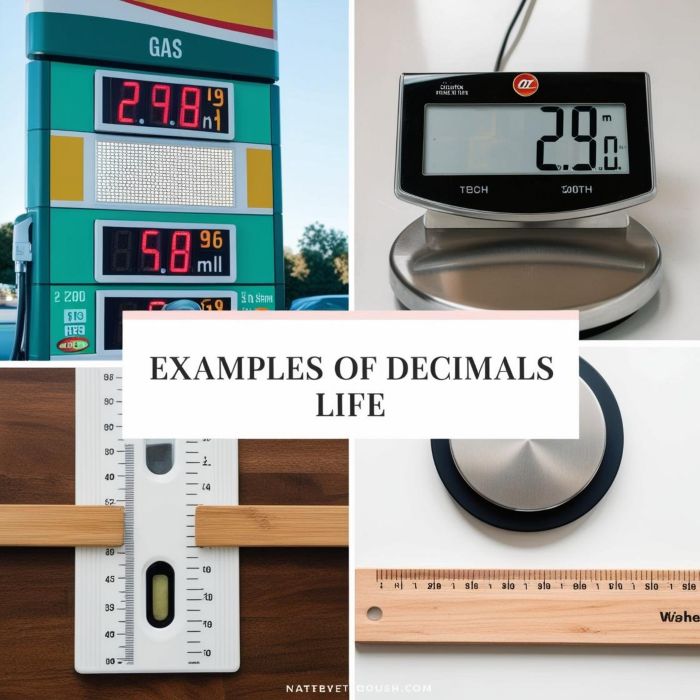Operations on decimals + Decimals in daily life
Decimals are numbers that include a decimal point to represent a fraction of a whole number. Understanding how to add and subtract decimals is important for handling numbers in everyday situations, like money, measurements, and more.
1. Adding Decimals
To add decimals:
-
Step 1: Line up the numbers vertically so that the decimal points are in the same column.
-
Step 2: Add extra zeroes to the end of any numbers to make them the same length if needed.
-
Step 3: Add the numbers as you would with whole numbers, starting from the rightmost digit.
-
Step 4: Place the decimal point directly below the other decimal points in your answer.
Example: Add 4.25 and 3.6.
4.25
+ 3.60
---------
7.85
Result: 4.25 + 3.6 = 7.85
2. Decimal subtraction
To subtract decimals:
-
Step 1: Line up the numbers so that the decimal points are in the same column.
-
Step 2: Add extra zeroes to make the numbers the same length if necessary.
-
Step 3: Subtract as you would with whole numbers, starting from the rightmost digit.
-
Step 4: Place the decimal point in the answer directly below the other decimal points.
Example: Subtract 5.8 from 9.45.
9.45
- 5.80
--------
3.65
Result: 9.45 - 5.8 = 3.65
Click Below to Learn more....
Practice Examples
Operations on decimals
Try solving these problems on your own!
Quizzes
Quiz 1: Addition Practice
-
What is the result of adding 6.78 and 2.54?
-
A) 8.32
-
B) 9.22
-
C) 7.54
-
D) 10.32
Quiz 2: Subtraction Practice
-
What is 8.5 - 2.75?
-
A) 5.25
-
B) 6.15
-
C) 5.75
-
D) 7.25
Quiz 3: Which statement is true?
-
A) 4.56 + 3.2 = 7.76
-
B) 5.8 - 1.3 = 4.7
-
C) 3.4 + 2.1 = 5.3
D) 6.0 - 0.75 = 5.15
Interactive ChallengePick a decimal problem you find tricky and try solving it step-by-step. Write down the steps you took and check your answer with a friend or teacher! |
Importance of decimals in our daily life

Decimals play a significant role in our everyday lives, even if we don't always realize it. Here are some key areas where decimals are important:
1. Money and Financial Transactions
-
Currency: Decimals are essential in dealing with money. For example, $5.75 represents 5 dollars and 75 cents. Decimals help in precise calculations for transactions, budgeting, and savings.
-
Interest Rates: When calculating interest rates for loans, savings accounts, or credit cards, decimals ensure accurate financial planning.
2. Measurements and Conversions
-
Cooking and Recipes: Many recipes require measurements with decimals, such as 1.5 cups of flour or 0.75 liters of milk.Distance and Length: In construction, crafts, and everyday projects, decimals are used to denote parts of an inch or centimeter (e.g., 5.5 inches).
-
Weight and Volume: Decimals help in weighing items in grams or liters for precise quantities (e.g., 2.5 kg of fruit or 1.2 liters of water).
3. Health and Medicine
-
Dosages: Medication doses often require decimals to ensure the right amount is administered, like 0.25 mg of a drug.
-
Body Measurements: Medical reports, including blood pressure or BMI, use decimals for accurate readings.
4. Science and Engineering
-
Measurements: Scientific experiments need accurate data representation, often with decimals, such as 9.81 m/s² for the acceleration due to gravity.
-
Precision: Engineering projects use decimals to ensure exact measurements for components and structures.
5. Time and Scheduling
-
Hours and Minutes: Decimals are used when expressing fractions of time, like 1.5 hours, which equals 1 hour and 30 minutes.
-
Sports Timing: In competitions, precise timing down to milliseconds (e.g., 9.58 seconds for a sprint) is crucial for fair results.
FAQs :
How to add and subtract decimals step by step?
Step 1: The numbers are first padded with zero depending upon the maximum digits present after the decimal for any of the numbers. Step 2: The numbers are lined up vertically along with each other. Step 3: Finally, add the decimal numbers similar to integers and place the decimal point accordingly.
What is the order of operations with adding and subtracting decimals?
The Order of Operations are as follows:
-
Parentheses.
-
Exponents.
-
Multiplication and Division in order from left to right.
-
Addition and Subtraction in order from left to right.
What are the 4 operations including decimals?
In mathematics, the four operations are addition, subtraction, multiplication, and division. You may be asked to use the four operations with integers, decimals, simple fractions (proper and improper), and mixed numbers. All of which can be positive or negative. Hence, we have that 456 + 346 = 802.
What are the operations of decimals?
You should become efficient in using the four basic operations involving decimals—addition, subtraction, multiplication, and division.
Practice Worksheets
Click below to refer worksheets
Easy Level Worksheets
Intermediate Level Worksheets
Advance Level Worksheets

